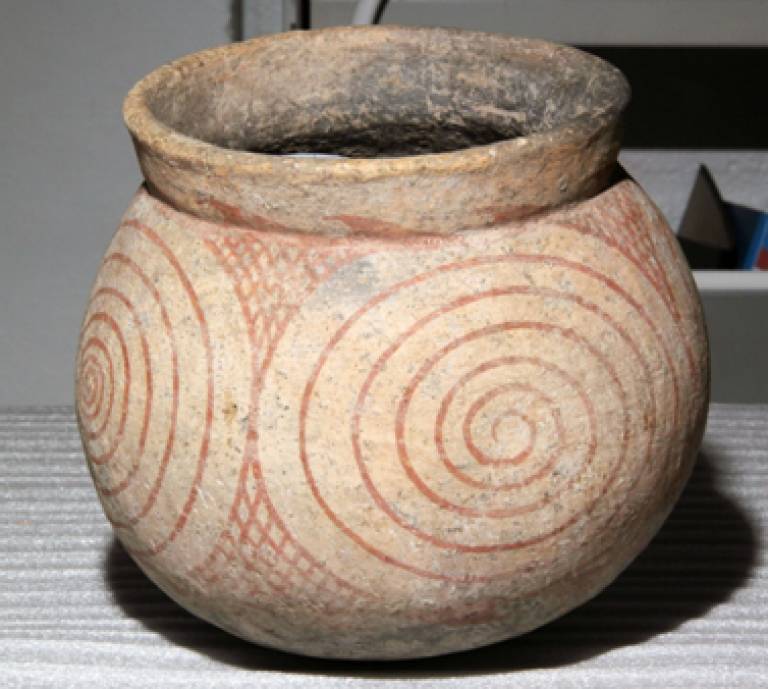UCL returns ancient objects to Thailand
10 August 2010
Press release Links:
 ucl.ac.uk/archaeology/" target="_self">UCL Institute of Archaeology
ucl.ac.uk/archaeology/" target="_self">UCL Institute of Archaeology
Sixteen objects, thought to originate from the UNESCO World Heritage Site at Ban Chiang in Thailand, will be returned to the Thai Department of Fine Arts by the UCL Institute of Archaeology.
The artefacts date from the Neolithic to Iron ages, between the 2200 BC to AD 200. They include a selection of vessels, bracelets and adzes that are thought to have come from either Ban Chiang or nearby sites in the Sakorn Nakhon basin, just south of the Mekong. They were donated to the Institute in the mid-1970s and were used in the teaching of South East Asian prehistory at UCL until the 1980s.
Since then, the items have been held in storage at the UCL Institute of Archaeology and were rediscovered in August 2009 as part of an ongoing audit of UCL's cultural property collections.
An event held this evening at the Royal Thai Embassy in London will mark the official transfer of the artefacts. Memorandums of understanding will be signed by the Embassy and the Institute to commemorate the transfer and promote Thai Studies at UCL through the establishment of a scholarship."In accordance with our commitment to UNESCO's Convention on the Means of Prohibiting and Preventing the Illicit Import, Export and Transfer of Ownership of Cultural Property we are in the process of re-cataloguing all cultural property acquired by the Institute of Archaeology since 1970," says Professor Stephen Shennan, Director of the UCL Institute of Archaeology. "As soon as we found these objects, we contacted the Royal Thai Embassy in London and have been working very closely with them over the last year to ensure that the material is returned as soon as possible."
"This initiative by the UCL Institute of Archaeology to repatriate the Ban Chiang artefacts to Thailand is highly appreciated and sets a good example for archaeological ethics and a good base for future cooperation between Thailand and the UK," says H.E. Mr. Kitti Wasinondh, Ambassador of Thailand to the UK.
As well as officially marking the transfer of the objects, The Royal Thai Embassy and UCL Institute of Archaeology will also announce a joint project to promote Thai Studies at UCL. A scholarship of 250,000 Bahts (approximately £5,000) will be awarded to a UK/European postgraduate student undertaking fieldwork in Thailand. The scholarship will cover a return airfare, accommodation, living expenses, research documents and related costs of conducting research in Thailand.
Media contact: Ruth Howells
Image: Vessel, globular cord marked bowl with red on buff spiral design. Ban Chiang culture, late period 300 BC - AD 200
UCL context
UCL has one of the largest and most diverse archaeological
departments in the world. In addition to core areas of archaeological
theory and practice, the UCL Institute of Archaeology is a leading
centre for research and teaching in interdisciplinary fields such as
Cultural Heritage and Museum Studies.
 Close
Close

